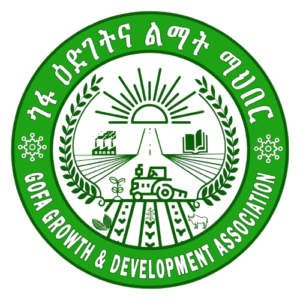GENERAL BACKGROUND INFORMATION
Gofa Growth and Prosperity Association (GGPA) is an indigenous, not-for-profit, and local non-governmental membership-based organization, established in 2012. It has been more actively functional in integrated development activities in Gofa zone. GGPA is re-registered with the Charities and Societies Agency of the Ministry of Justice of the Federal Democratic Republic of Ethiopia on December 14, 2012 under registration license number 4650. It will renewable every three years. The head office of the organization is located in Gofa Sawula town and branch offices are functional in all the 7 Woredas and 2 towns Administration within Gofa; and in five other areas: Addis Ababa, Arbaminch, Hawassa, Wolaitta and Diredawa.
GGPA MANDATE ANALYSIS:
Mandates of GGPA derive from FDRE constitution article 31 and 43 (sub article 1 & 4). Article 31 of the Constitution provides for freedom of association which reads as “Every person has the right to freedom of association for any cause or purpose”. Sub article 1&4 article 43, on the other hand, provides for the right to development and reads as: 1. The peoples of Ethiopia as a whole and each Nation, Nationality and People in particular, have the right to improved living standards and to sustainable development; and 4. The basic aim of development activity shall be to enhance the capacity of citizens’ for development and to meet their basic needs.
Meanwhile proclamation No 621/2009 to provide for the registration and regulation of charities and societies Article 14 sub-article 2 a – i is another major source of GGPA mandates pursuant to the above mentioned article 31 of the FDRE constitution. The provisions in article 14, sub article 2 a – i read as follows:
Charitable purpose shall include: a) the prevention or alleviation or relief of poverty or disaster; b) the advancement of the economy and social development and environmental protection or improvement; c) the advancement of animal welfare; d) the advancement of education; e) the advancement of health or the saving of lives; f) the advancement of the arts, culture heritage or science; g), the advancement of amateur sport and the welfare of the youth; h) the relief of those in need by reason of age, disability, financial hardship or other disadvantage; i) the advancement of capacity building on the basis of the country’s long term development directions.
STRATEGIC OBJECTIVES AND AREAS OF INTERVENTION:
- To continuously monitor, study and identify the causes of poverty of Zone and its people, recommend solutions and play supportive roles;
- To raise awareness on environmental protection and biodiversity conservation, mobilize the community for practical interventions, and play supportive roles;
- To promote modern agricultural practices and raise public awareness to improve productivity and ensure food sovereignty based security;
- To promote micro financing activities and services;
- To mobilize and build the capacity of youth to promote inter-generational learning, entrepreneurship, respect for work and contribute to zonal socio-economic development efforts
- To promote and work towards improved supply of clean water and sanitation services
- To promote and work towards improved family planning and reproductive health services;
- To raise awareness and work towards improved protection from HIV/AIDS and other communicable diseases in the Zone;
- To build the capacity of primary and secondary schools and improve access and quality of modern education in the Zone;
- To enhance and support economic empowerment and female education and gender mainstreaming to improve socio-economic development role of women
- To document the history, culture and heritage of the Zone along with developing and promoting Gofa and Oyda language and Eco Tourism Opportunities;
- To mobilize and support the community to actively participate in economic infrastructure development
- To establish and strengthen resource mobilization schemes enabling GGPA perform its developmental activities; and
- To identify, and support needy people with disability, elders and orphans to become self-supporting citizens

